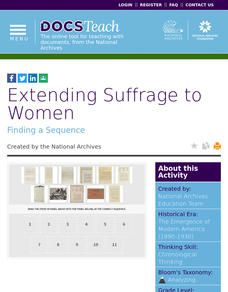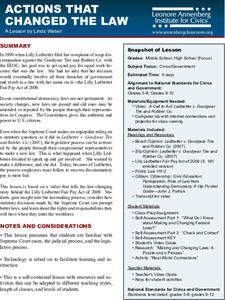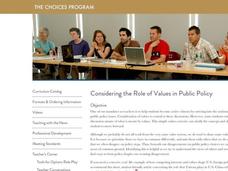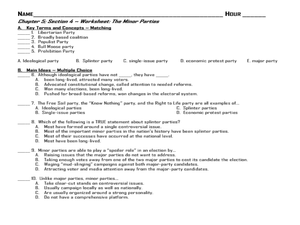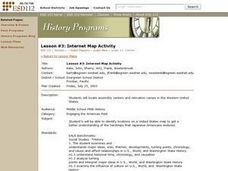Curated OER
Pioneering Principles: Why Character Matters
What does it mean to "be of good character"? What are the qualities that define such a person? The 1825 Colonization Law of Coahuila y Texas required that all new immigrants into Mexican Texas present documentation that they were of good...
Center for History Education
Democratic Ideas of the 1776 Maryland Constitution
1776 was a year of political upheaval in the American colonies. Academics examine the Maryland Constitution to understand the desire to break with Great Britain. Young historians learn about Maryland's efforts to extend rights to its...
Center for History Education
Helping to Move On? An Analysis of the Reconstruction Amendments
Reconstruction amendments: a helping hand or another form of slavery? An inquisitive lesson compares the Reconstruction legislation that ended slavery, granted citizenship, and protected voting right for African American men. Scholars...
Lesson Planet
Black History Month: Celebrating Diversity and Progress
Black History Month is a time to recognize the achievements of our civil rights heroes while looking toward the future with a vision of equality for all.
DC Vote
One Kid, One Vote
Learn about why the citizens of Washington, D.C. feel unrepresented in Congress with an article about D.C voting rights. Individuals read about the movement toward congressional representation in Washington, D.C., before answering...
DocsTeach
Extending Suffrage to Women
Votes for women! The activity highlights the push for the Nineteenth Amendment giving women the right to vote. High school scholars learn how the Fifteenth Amendment giving African American men the right to vote helped to spark the...
Curated OER
Global Hunger and Malnutrition
Is there a difference between hunger and malnutrtion? Is this a problem only in third world countries? How does hunger and malnutrition affect the community? Why do these problems exist when the world produces enough food to feed...
Facing History and Ourselves
Insights on Democracy from South Africa
As part of their study of democracy, high schoolers listen to a podcast featuring two South African educators and their efforts to support the process of transforming the nation from apartheid rule into a democracy. Learners also read...
Annenberg Foundation
Actions that Changed the Law
The Fair Play Act of 2009 came about due to the actions of one woman. Young historians research Lilly Ledbetter and what she went through to get pay equal to that paid to men for the same work at Goodyear Tire and Rubber Company. The...
Smithsonian Institution
A New America: The Hart-Celler Immigration Act of 1965
Many dream of coming to America, but few may enter. The lesson explores the Hart-Celler Immigration Act of 1965 and how it changed immigration policies in the United States. Academics learn how immigration quotas impacted Western Europe...
Brown University
Considering the Role of Values in Public Policy
Strong opinions come from deeply held values. Young citizens explore the values that are most important to them in a class discussion and activity. As they prioritize a list of values cards that include freedom, justice, and democracy,...
Reading Through History
The Leadership of George Washington
Why did Americans choose George Washington as their first president? After reading the resource, pupils discover why citizens trusted him to lead the country. They learn about his time as a military leader, as well as his actions after...
DocsTeach
Exploring America's Diversity: Luther Powell (Beginner)
Luther Powell immigrated to the United States to live the American dream—and create a better life for his son, four-star general Colin Powell. Elementary academics look at documents, such as, ship records to understand the immigration...
Mikva Challenge
The Great Electoral Race Kickoff
Do young people care about elections? Host a discussion about the role of young citizens in the electoral process with an engaging social studies lesson. As high schoolers read and respond to four statements about youth interest in...
K20 Learn
(Mis)Reported and (Mis)Remembered: The Vietnam War
What are the complicated legacies of the Vietnam War? Learners consider the question as they examine videos and primary sources from the conflict. After examining footage and documents such as the Gulf of Tonkin Resolution and an op-ed...
Judicial Branch of California
Where We Fit In: The Judicial Branch
An interesting resource addresses the role of youth in civic participation and community events. It also explains the role of the justice system in creating boundaries and how citizens play a part in the judicial process. Pupils listen...
Judicial Branch of California
Public Service Announcement: Civic Responsibility
Get your message across. Scholars use their prior knowledge and artistic skills to create public service announcements. The project is designed to explain the importance of civic harmony and the responsibility of all citizens to...
DocsTeach
Exploring America's Diversity: Motel Garber (Beginner)
Young detectives delve into the past in an exciting series exploring immigration. The activity uses primary sources to teach elementary scholars historical analysis. Academics read records to understand the life of Motel Garber, from...
Franklin D. Roosevelt Presidential Library & Museum
Role Playing Relating to Big Decisions
While most high schoolers are too young to vote, they still need to learn the skills needed to solve problems. The ninth resource in a 10-part civics series presents class members with four "What Would You Do?" scenarios that have them...
Penguin Books
A Teacher's Guide to the Signet Classics Edition of Walden and "Civil Disobedience" by Henry David Thoreau
According to Henry David Thoreau, every citizen must object to unjust laws. The teacher's guide to Thoreau's "Civil Disobedience" begins with a detailed essay synopsis to help readers understand Thoreau's rationale in the challenging...
Roy Rosenzweig Center for History and New Media
Reward: Valuable Slaves
To gain insight into the American institution of slavery and how African Americans were viewed during this time, groups examine run-away slave ads and slave auction broadsides. Teams use the provided worksheet to record their impressions...
Curated OER
Our Political Beginnings: Ch 1
Quiz your middle schoolers on the political beginnings of American government. They will answer 5 matching and 5 multiple choice questions. Great as a quiz, homework, or comprehension questions.
Curated OER
The Minor Parties
Help to increase the knowledge of your future (or current) voters with this quiz about minor parties. By matching various minor parties, both historical and contemporary, students can become better-informed about the entirety of American...
Curated OER
Lesson #3: Internet Map Activity
Learners label assembly centers and relocation camps on a given map of the United States in order to create a better understanding of the relocation experience of Japanese-American citizens and the distance that families had to move and...







